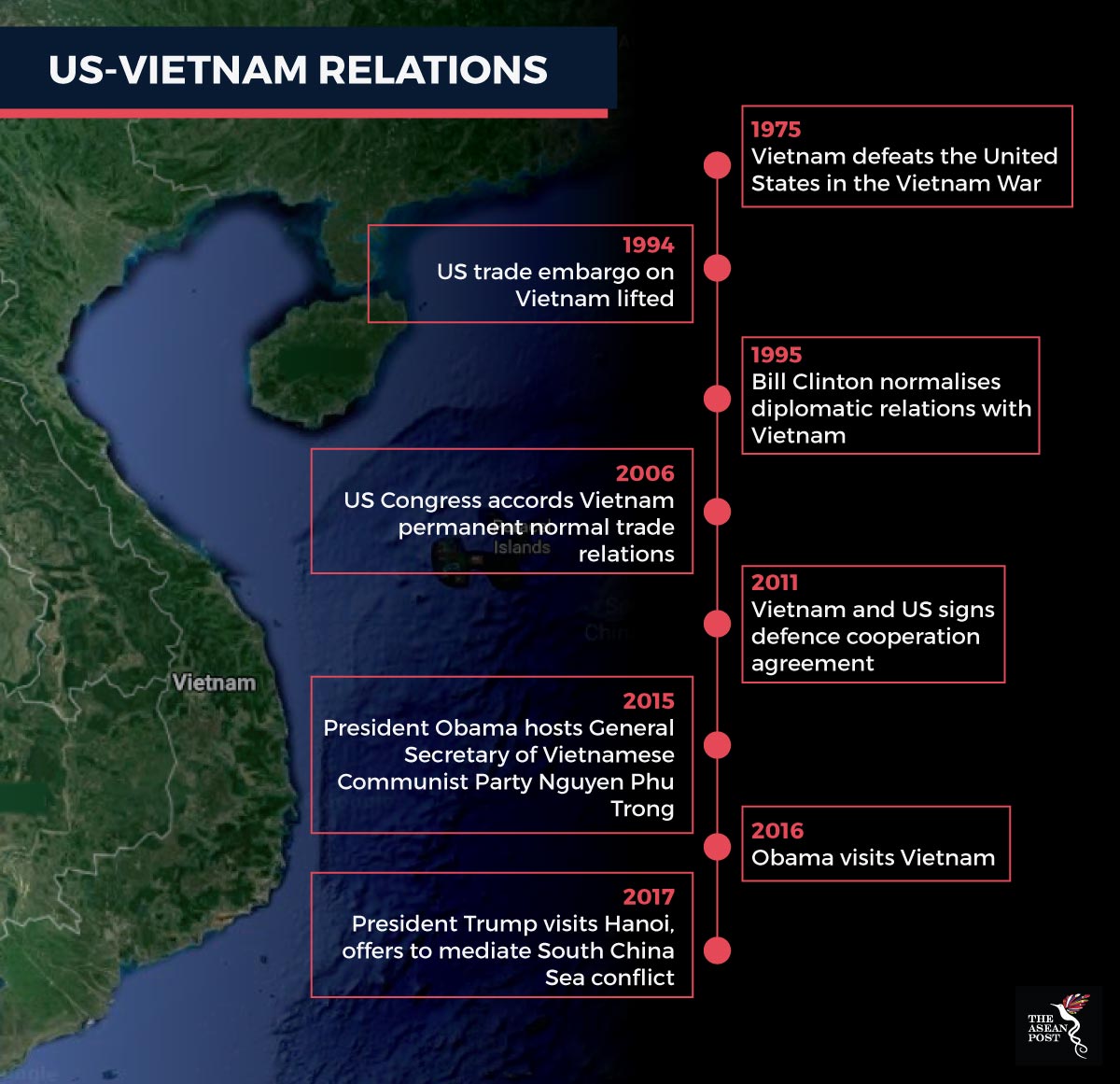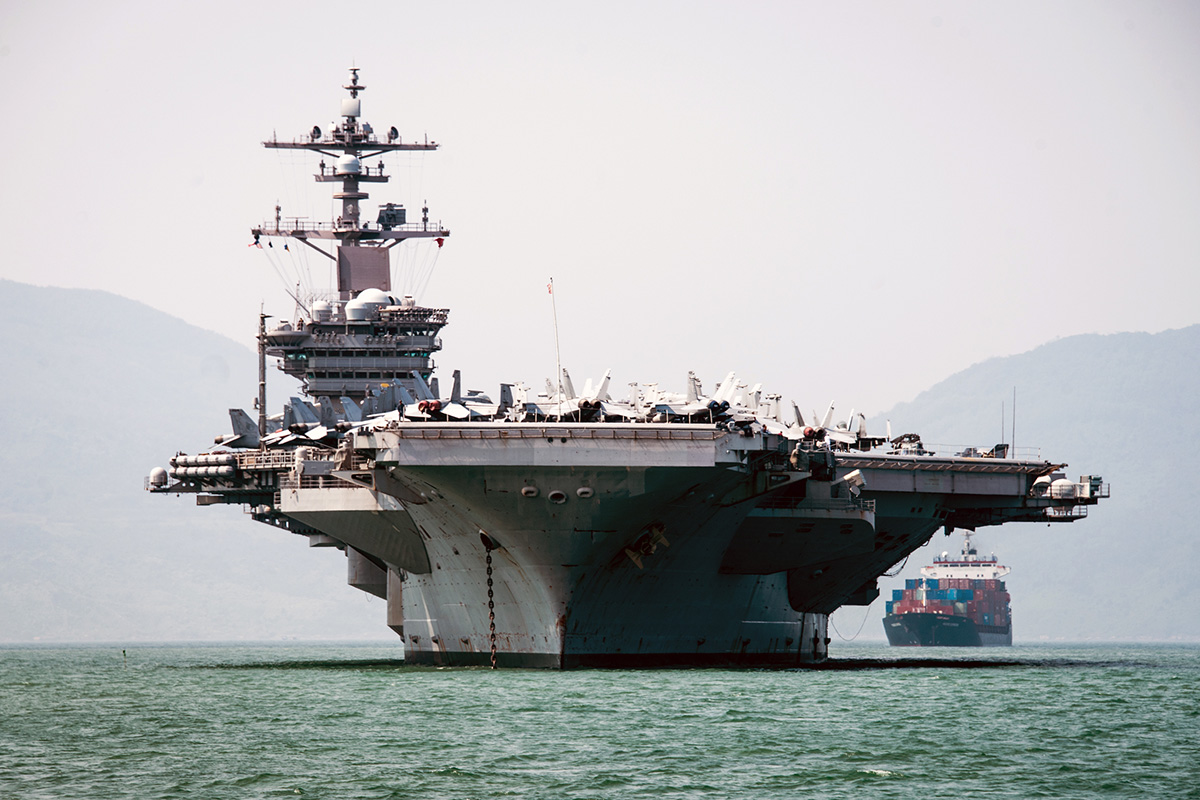Earlier this week, a United States (US) navy aircraft carrier made its way to Vietnam for the first time since the end of the Vietnam war in 1975. The central coastal city of Da Nang saw the arrival of the USS Carl Vinson which had more than 5,000 crew members along with a cruiser and destroyer. Da Nang was also the first location where US troops landed during the Vietnam war, making the visit even more significant.
This move by the US has been interpreted as a show of strength by both nations amid Chinese military build-up in the South China Sea. Recent satellite images have shown that China is building naval and air bases on the Spratly Islands in the South China Sea. These recent developments have brought up concerns on China’s domination of the area. There are also fears that increased military involvement from China and the US could lead to further conflict in the region.
US-Vietnam relations
Despite the war between the two countries, US and Vietnam relations have flourished over the past two decades. The USS Carl Vinson’s visit to Vietnam confirms this.
US-Vietnam relations started to grow after former US President Bill Clinton normalised its diplomatic relationship with Vietnam in 1995. Ever since then, Vietnam and the US have been slowly building on their relationship. A turning point in the relationship was during the Obama administration.
Under President Obama, Vietnam and the US signed a Memorandum of Understanding on Advancing Bilateral Defence Cooperation, which involved cooperation in maritime security, humanitarian assistance, peacekeeping and disaster relief. Furthermore, Obama also hosted Vietnam Communist Party leader, Nguyen Phu Trong at the White House in 2015 and paid a visit to Hanoi the following year. This was all part of Obama’s pivot to Asia, an effort by his administration to counterweigh Chinese influence in the region by setting up trade deals and offering military assistance.

Source: Lowy Institute
Despite Vietnam’s relationship with the US, China still remains an important trading partner of Vietnam. At the moment, according to a Lowy Institute report from 2017, China is Vietnam’s largest trading partner and relies on them for the supply of parts for most of their key exports.
South China Sea
So why is Vietnam risking its partnership with China by cosying up to the US?
According to the Lowy Institute, China’s increasing assertiveness in the South China Sea has pushed the US and Vietnam together.
Vietnam is currently at loggerheads with China over territory in the South China Sea. The nine-dash line area claimed by China covers most of the South China Sea and overlaps with the exclusive economic zone claims of Brunei, Indonesia, Malaysia, the Philippines, Taiwan, and Vietnam. When the United Nations ruled that China had no historical rights based on the nine-dash line, Vietnam along with the Philippines were the only ASEAN countries that openly welcomed the ruling. According to the Lowy Institute, other ASEAN countries were more muted in their responses fearing consequences from China.
Their disagreement over the South China Sea has some worried that a military confrontation could happen between Vietnam and China. The BBC reported in 2017 that China had warned Vietnam that they would attack their military bases on the Spratly Islands if they continued drilling in a disputed area of the South China Sea.
At the moment, militarily and economically, China is head and shoulders above Vietnam. This could explain Vietnam’s growing relationship with the US at the moment. Given China’s increasing militarisation in the South China Sea coupled with the US’ intentions of containing Chinese influence, Vietnam’s alliance with the US makes sense.
Analysts have pointed out that the arrival of the USS Carl Vinson was merely a symbolic gesture and that Vietnam has no real intention of becoming a military ally of the US. Joseph Cheng, a professor of political science at the City University of Hong Kong told Australian news website news.com, “…it seems that Vietnam does not intend to become an ally of the United States. It is basically a kind of hedging strategy, a kind of balance of power strategy.”
Vietnam is wise to utilise their strategic location to play off the two superpowers for their own interests. However, they need to be careful to not add fuel to a simmering fire and increase tensions in the region.
